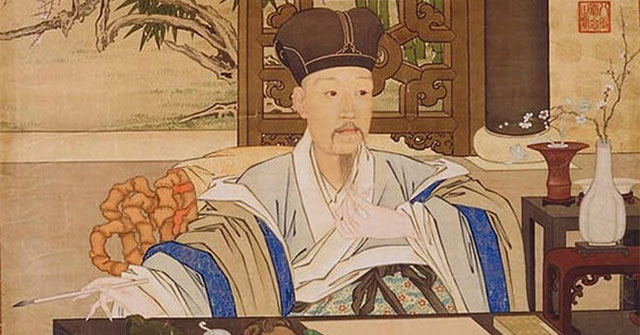In ancient times, why did the courtiers call the Emperor 'Your Majesty'?
In many historical dramas, we often see the ministers when meeting the Emperor calling themselves 'His Majesty'. So how did the word 'Your Majesty' become the title of the Emperor?
The titles of the Emperors in ancient times were many, for example, the Emperor called himself 'Lady', 'I', the concubines, the great ministers called the Emperor 'His Majesty', 'Van live'. … From the surface meaning of the word, it can be seen that these titles all have the meaning of showing respect, fear, and blessings.
As for the word 'His Majesty', in the 'Theory of Literature and Liberation', Hua Than said: 'Your Majesty, rise to high rank. Subservient, begrudgingly', which means, 'Beat' is a step up. In the modern Chinese dictionary explanation of the word 'pedestal' is simply the steps or steps in the palace. 'Your Majesty' is the bottom of the steps.

In ancient times, the earliest word 'pedestal' was actually used to refer to the stairs from below to the top of the platform. The 'pedestal' can be made of earth, sometimes of wood, with a variety of designs from simple to sophisticated. In ancient times, only a King or a vassal had the right to build a tower as his residence. Gradually, the 'Pedestal' became the steps in the monarch's palace.
According to historical records, the ancient Imperial Palace was designed relatively carefully. The Emperor's throne room is placed on high, from the bottom looking up the throne has a system of steps. These steps are called 'pedestals'. To protect the Emperor's safety, the guards were divided to stand on either side of the steps. At the time of setting the court, the great gods stood below. When the ministers wanted to report something, they did not dare to call the Son of Heaven directly, so they called 'Your Majesty', meaning that they wanted to tell His Majesty, asking the guard on the steps to convey the message. Thereby also to indicate that people of low status are directed to people of noble status (His Majesty) for advice.
This can be found in historical documents. The famous scholar Thai Ung of the Eastern Han Dynasty wrote: 'Calling the emperor, means a courtier, when speaking to the son of heaven, he does not dare to criticize the son of heaven, so he speaks to the people under the pedestal to convey the message, meaning that a person of low status is directed to to a person of honorable status'. Therefore, 'His Majesty' became the noun for the Emperor, only the minister waited for the will under the pedestal, the Emperor sat on the high pedestal waiting for someone to deliver the message.
There are historical documents indicating that 'Your Majesty' also has the meaning of the title of the person who exercises royal authority. According to records in the Han Dynasty, during the Han Dynasty of the Yuan Dynasty, Queen Vuong Chinh Quan was once honored by the Han god - Vuong Mang as 'Your Majesty'.
In addition to the word 'His Majesty', words such as 'Your Majesty', 'His Royal Highness', 'His Majesty', 'His Majesty'… also imply the respect of the subordinates towards such superiors. .
Since the Qin Dynasty, the word 'His Majesty' has been widely used to refer to the Emperor. As in 'History. Qin Shi Huang's copy of the book', Sima Thien wrote: 'Since ancient times, there has been no one as powerful and virtuous as His Majesty'. The word His Majesty here refers to Emperor Qin Shi Huang.
- How did the Chinese emperor experience the night of the room?
- Revealing the gay lover of the Roman emperor
- The Roman emperor and the hobbies' room
- Why does the ancient emperor unconditionally love the magnae?
- Why did the ancient emperor spend the night with hundreds of thousands of beauties but not infected with sex?
- Royal treasure in Luu Phi Tomb
- Why hasn't China dared to excavate the tomb of Qin Shui Huang?
- Ancient tombs are full of Chinese emperor's treasures
- The identity of the ancient Triple Emperor
- The Roman Emperor and the preferences
- Pencil history
- The Treasure of the Emperor of Japan 'taken from the 8-headed caudal fin'
 Biography of hero Vu A Dinh
Biography of hero Vu A Dinh History of hematology
History of hematology Who is Mr. Tam Da 'Phuc-Loc-Tho' and what does it mean?
Who is Mr. Tam Da 'Phuc-Loc-Tho' and what does it mean? Unbelievable facts about the history of the oil and gas industry: Gasoline used to be cheaper than water, so abundant that it had to be dumped into the river...
Unbelievable facts about the history of the oil and gas industry: Gasoline used to be cheaper than water, so abundant that it had to be dumped into the river...